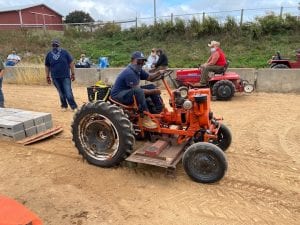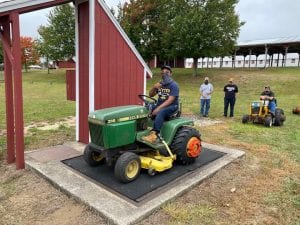 The Goshen Fairgrounds in Litchfield County stretches out in an expanse of open space, rings, and buildings that host the annual fair and other events. On Sunday, September 27th vehicles towing tractors slowly started arriving for the first annual Litchfield County 4-H Garden Tractor Pull. UConn 4-H, Extension’s youth development program in the College of Agriculture, Health and Natural Resources (CAHNR), hosted this socially distanced event.
The Goshen Fairgrounds in Litchfield County stretches out in an expanse of open space, rings, and buildings that host the annual fair and other events. On Sunday, September 27th vehicles towing tractors slowly started arriving for the first annual Litchfield County 4-H Garden Tractor Pull. UConn 4-H, Extension’s youth development program in the College of Agriculture, Health and Natural Resources (CAHNR), hosted this socially distanced event.
Diego Marks of Bethany woke up early the morning of the tractor pull. He hadn’t participated in a pull with UConn 4-H before. The pandemic cancelled the other tractor pulls he was supposed to compete in this year. Diego, a 9th grader at the Engineering Science University Magnet School in West Haven, was looking forward to getting his tractor out and testing the modifications he had made. He packed extra masks and hand sanitizer, in case anyone needed them, and secured his tractor for the trip to Goshen with his parents.
Youth acquire engineering and math skills when they’re working on their tractors and participating in a tractor pull. Machines pull sleds with weights at a tractor pull. Those that can pull the sled the farthest, win. Weights become progressively heavier as the day continues. Tractor operators must be strategic and skilled. Tractor engines lose momentum and torque when they are continuously pulling weight. A successful pull requires momentum and torque. The operator that can modify his machine’s engine to withstand the most pressure and successfully manage the engine throughout the demands of the day often wins.
 “My son has been tractor pulling since the age of six, and was very disappointed with the season being cancelled,” Wendy Marks ’92 (CLAS) says. “The day he heard that Litchfield County 4-H would be able to host the tractor pull, he was beyond excited! It instilled a joy and excitement in him that was missing for a long time because of the pandemic. Immediately he began preparing his tractors and discussing with his friends how great of an opportunity this is.”
“My son has been tractor pulling since the age of six, and was very disappointed with the season being cancelled,” Wendy Marks ’92 (CLAS) says. “The day he heard that Litchfield County 4-H would be able to host the tractor pull, he was beyond excited! It instilled a joy and excitement in him that was missing for a long time because of the pandemic. Immediately he began preparing his tractors and discussing with his friends how great of an opportunity this is.”
Opportunities to participate in a program can introduce a whole new world of ideas and experiences to youth. UConn 4-H offers transformational life experiences for youth through our club-based programs, afterschool programs, and various other events and activities. The Garden Tractor Pull is one example of our commitment to offering youth opportunities to learn and grow.
“We had over 35 entries at the Garden Tractor Pull,” says Bill Davenport, the UConn 4-H Educator in Litchfield County. “It was a team effort and many volunteers made it happen while adhering to strict safety and social distancing guidelines due to coronavirus. Volunteers and sponsors that helped coordinate the event include Shawn Uscilla, O & G Industries, Missy Cole and the Willing Workers 4-H Dairy Club, and Dean Florio and the Working Wheels 4-H Tractor Club.”
Diego’s father, William Marks, volunteered in the pit crew area of the tractor pull all day, helping hitch and unhitch tractors from the weight and measure distances pulled. Diego’s grandparents, Edward and Hazetta Jackson spent the day at the tractor pull with the family, cheering on all the participants.
Edward Jackson ’62 (CAHNR) was a 4-H member in his youth and started a lifelong journey for his family with UConn. Wendy and her three sisters all graduated from UConn. Hazetta helps Diego every step of the way, helping him with school and getting his tractors ready. She drives him to the different stores for tractor parts; both grandparents are a big part of encouraging Diego and his engineering interests.
“In my spare time, I enjoy working on my tractors, and inventing items that help homeowners make chores easier and faster,” Diego says. “Skills I have learned at school have helped me to fix and modify my garden tractors. My future career goals are focused on owning an engineering and construction company where large equipment is a daily part of my business. One of my goals in the future, is to be able to give back to the community and help others have a 4-H experience.”
Diego is new to 4-H, he’s a member of the 4-H dog club in Hamden and recently joined the Working Wheels in Morris after meeting other youth at the tractor pull. “4-H is very important to me because it gives me the opportunity to be outdoors and work with nature. I am a kid that loves the outdoors,” he says.
“My son is a hard-working student in school, however, with no activities to look forward to, it is hard to keep him  motivated on his studies,” Wendy Marks says. “The 4-H tractor pull is exactly the type of activity he needed to keep him working hard in school. What a way to raise a child’s self-esteem, interest and keep them motivated to be involved! At the 4-H tractor pull, for the first time, he placed first in one of the classes.”
motivated on his studies,” Wendy Marks says. “The 4-H tractor pull is exactly the type of activity he needed to keep him working hard in school. What a way to raise a child’s self-esteem, interest and keep them motivated to be involved! At the 4-H tractor pull, for the first time, he placed first in one of the classes.”
Transformational life experiences can happen anywhere, at any life stage. The magic in the UConn 4-H program is that there is something for every youth member. Diego Marks, a young man with a keen interest and skills in engineering, found a new community and opportunities for continued growth and lifelong learning at the Litchfield County 4-H Garden Tractor Pull.
UConn 4-H is the youth development program of UConn CAHNR Extension. 4-H is a community of over six million young people across America who are learning Science, Technology, Engineering and Math (STEM), leadership, civic engagement, and life skills through their 4-H project work. Learn more and enroll your child in the UConn 4-H program at http://4-H.uconn.edu/.
UConn CAHNR Extension has more than 100 years’ experience strengthening communities in Connecticut and beyond. Extension programs address the full range of issues set forth in CAHNR’s strategic initiatives:
- Ensuring a vibrant and sustainable agricultural industry and food supply
- Enhancing health and well-being locally, nationally, and globally
- Designing sustainable landscapes across urban-rural interfaces
- Advancing adaptation and resilience in a changing climate.
Programs delivered by Extension reach individuals, communities, and businesses in each of Connecticut’s 169 municipalities.
Article by Stacey Stearns